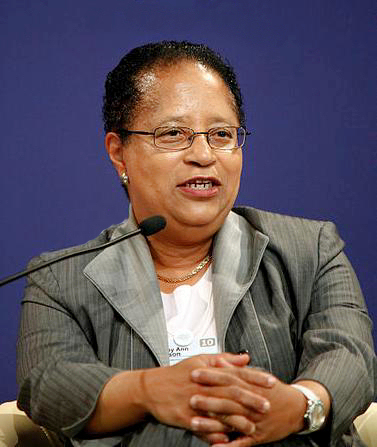Culture
MFA Celebrates Dr. Shirley Ann Jackson during Black History Month

This blog was co-authored by former MFA Copy Editor Patricia Collins.
For Black History Month, MFA is celebrating Dr. Shirley Ann Jackson and her contributions to education for Black and minority students. MFA believes that encouraging students’ interests in our services, breaking barriers, and opening opportunities in education will help increase diversity in our industry. Dr. Shirley Ann Jackson’s work has not only enabled her own successful career in science, but also helped pave the way for future generations.
Dr. Shirley Ann Jackson speaking during the “WHAT IF: the United States remains in a jobless recovery in 2011?” session at the Annual Meeting of the New Champions in Tianjin, China, September 15, 2010.
Jackson’s parents always encouraged her to develop her science interests, even when she was very young. In the 1960s, having been encouraged by the assistant principal for the boys at her Washington DC high school, she attended MIT. Because she was black, other female students there refused to include her in their study group, even though she knew how to work through physics problem sets. Students also refused to sit next to her in her classes. Initially, Jackson decided to focus on her schoolwork.
However, the assassination of Dr. Martin Luther King, Jr., propelled her into action. She and other students organized the Black Student Union. As part of that work, Jackson was named to a task force to recruit minorities. In 1968, she toured the Midwest looking for students who hadn’t considered MIT. As a result, the number of Black students attending MIT increased from two to 57 in one year. But her efforts didn’t stop with recruiting. She wanted these students to succeed, so she helped create and lead a summer program so minority students could begin their college years with the building blocks they needed. Five decades later, the program continues and has helped more than 2,000 students.
Jackson was the first Black woman to earn a PhD from MIT in any subject. With her doctorate in physics, she has worked in government, business, and academia. In 2006, she called attention to a “quiet crisis,” noting that a generation of scientists was on the verge of retirement and there weren’t enough scientists on deck to replace them. Throughout her career, she has advocated for more women and minorities in the sciences.
Like Jackson, others have seen a need for programs that increase the success of underrepresented college students. In Portland, the Emerging Leaders Internship (ELI) program created an internship program that challenges local business leaders to “play an active role in fostering diversity, equity, and inclusion in their own companies.”
ELI matches underrepresented college students and recent graduates with top employers for a paid summer leadership-track internship. The host company provides mentorship for the intern, and ELI provides professional development opportunities for the students and encourages them to return for further networking opportunities. MFA is proud to partner with ELI and take an active role in career development for the students they serve.
Stay Connected
At Maul Foster & Alongi, we’re passionate about what we do and we love sharing our work with our clients and partners. Follow us on social media for project and staff updates, upcoming events, and an inside look at what it’s like to work with us.




